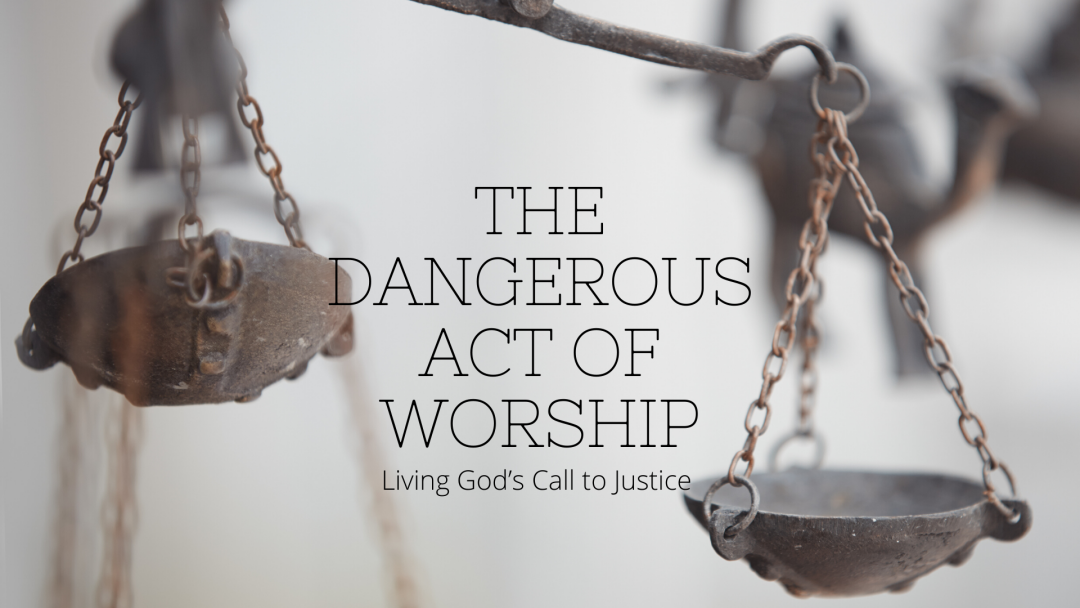
Where does your mind go when you hear the word “worship?”
Speaking for myself, several years ago, when I would think of worshipping, I pictured a group of people in a large room with words on the screen and a band, singing songs. In some instances, the participants may be in a small room with only one singer playing an acoustic guitar. Regardless of the surroundings, in my head, worship definitely involved singing, probably with your eyes-closed, and hands-lifted, and overhearing an occasional harmony from the stranger standing in my row.
If someone asked me a couple of years ago, “is worship safe?” I would proclaim that it is. I mean, how could anyone get hurt singing? My viewpoint soon changed when I stumbled across a book that immediately caught my eye. The title read: “The Dangerous Act of Worship: Living God’s Call to Justice” by Mark Labberton. Worship? Dangerous? Those were words that I did not think belonged in the same sentence. However, now I know that true worship is one of the most dangerous things that you could do. Truly living God’s call to justice is not a calling of safety and comfort. Here are some my favorite quotes and takeaways from, “The Dangerous Act of Worship”
“If we worship Jesus Christ-- we must behave like Jesus Christ.”
Worship is all-encompassing. Yes, that includes the singing on Sunday morning, but it also includes how we treat our neighbor or coworker. When we examine Jesus’ life, we do not see him masquerading as a righteous person one day of the week: His whole life and treatment of others was consistent. Since I worship Jesus Christ, my life and treatment of others should consistently reflect His, not just on Sunday.
“If God so loved the world-- we should do the same.”
It is so easy for us to love those who treat us well or love those who have something of value to give to us in return. However, God loved the world enough to send His son. Not just to the rich or powerful people of the world, but the people who have nothing to give to Him in return except their worship.
“The mind is one of the best of God’s gifts, and one of the highest potential idols.”
In Genesis chapter 3, we see how the serpent manipulates Adam and Eve to eat the fruit and “...be like God, knowing good and evil” (Genesis 3:5). God created our minds and gave humans the responsibility of stewarding the Earth. With Sin, our minds have the potential to be one of our greatest idols. Human minds have created cures for illnesses; they also have implemented unspeakable acts of injustice against people.
“Name injustices for what they are.”
As believers, we have to be comfortable confronting pharaoh or calling out injustice for what it is. In the same way that we hope never to deny Christ, we should also be unwilling to stand silent in the face of injustice.
Especially this week, as we reflect on the civil rights work of Martin Luther King, Jr, we may be encouraged to see how far the nation has come in the past 70 years, or we may be discouraged at how far of a journey we have remaining for true equality and justice. Ultimately, Dr. King’s pursuit of justice was the reason why he was killed.
As a biracial woman, inequality is constantly at the forefront of my mind. While it is easy for me to become discouraged with my earthly surroundings, I choose to fix my gaze on the creator of all things just and righteous. I live God’s call to justice through my profession as a financial literacy educator, providing resources to people who may have never taken control of their money. I live God’s call to justice by speaking up in the face of oppression, as Christ would. I live God’s call to justice by loving the ones who Christ loved. Practicing God's call to justice is exhausting, thankless, and at times very dangerous. It is also one of the most rewarding things that humans can do.
Whether you are young or young at heart, let me leave you with some encouragement. God loves justice, so much so that He simply could not overlook the wrong that humans have done. Rather than allowing us to die, He sent His only son to come down as a poor Middle Eastern man so that He could not only save us but relate to everyone. He then lived a perfect life, died under the hands of an unjust government, and rose again so that we may live eternally. When we encounter others, let us always see the image of God in them. Let us pray to live God’s call to justice as Jesus did.

